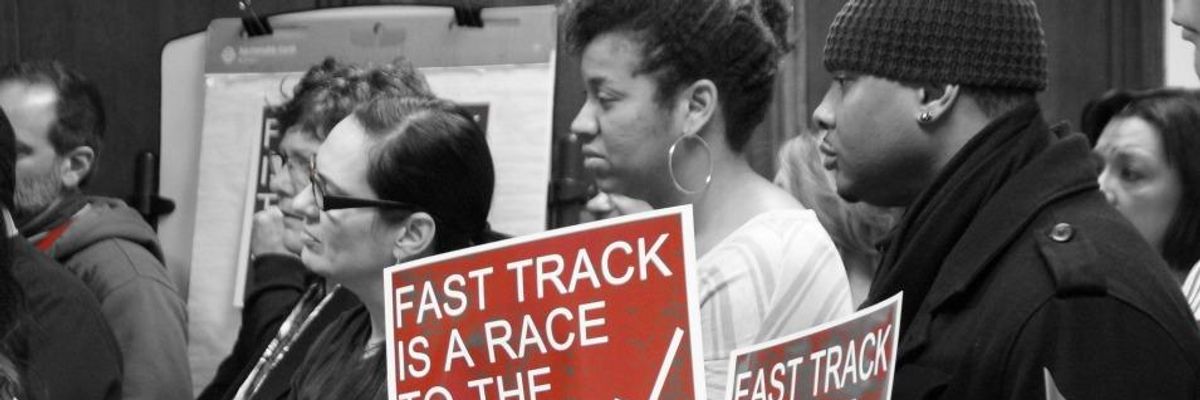Progressive concerns that Tuesday's Republican sweep of the Senate could bring about faster approval of problematic trade deals may be unfounded, said the director of the consumer rights advocacy group Public Citizen this week.
When asked on Wednesday about issues on which President Obama and Republicans agree, GOP Senator Mitch McConnell--who is expected to become the next Senate majority leader after his victory in Kentucky this week--identified trade agreements and tax reform as potential areas of overlap.
"The reality is, it's kind of hard for the Republicans to voluntarily delegate more authority to the guy they've been attacking as the imperial president who grabs power that's not his."
--Lori Wallach, Public Citizen
"Trade agreements," McConnell said at a press conference. "The president and I were just talking about that right before I came over here. Most of his party is unenthusiastic about international trade. We think it's good for America. And so, I've got a lot of members who believe that international trade agreements are a winner for America. And the president and I discussed that right before I came over here, and I think he's interested in moving forward. I said, 'Send us trade agreements. We're anxious to take a look at them.'"
Indeed, some analysts have suggested that the GOP takeover of the U.S. Senate paves the way for approval of so-called "Fast Track," a rarely used procedure by which Congress delegates its trade authority to the president.
With two troubling trade pacts on the table--the Trans-Pacific Partnership (TPP) and Transatlantic Trade and Investment Partnership (TTIP)--handing over such control could effectively open the door to passage of deals that are good for corporations, Big Pharma, and too-big-to-fail banks, but bad for the American people.
"[T]he TTIP and TPP (the two main deals currently being negotiated) will do almost nothing to increase trade and quite possibly could reduce it," writes Dean Baker, co-director of the Center for Economic and Policy Research.
Baker argues:
Both deals are primarily about imposing a business-friendly regulatory structure on the signatories to the agreements. One aspect of this regulatory structure is creating a quasi-judiciary system, investor-state dispute settlement councils, which would operate outside the existing legal structure of the countries in the agreements. The agreements, which are being negotiated in secrecy, also will have provisions on the environment, health and safety regulation, and copyright and patent protection. All of these provisions will supersede existing domestic law and regulation.
The increases in patent and copyright protection in these deals (yes, that is "protection" as in the opposite of free trade) will raise the price of prescription drugs and other items. These higher prices will reduce purchasing power and slow growth. They will likely lower, not raise, the amount of trade. This means that if Republicans are actually enthusiastic about increased trade, they probably would oppose both the TPP and TTIP.
Of course, the TPP "is really a delivery mechanism for a lot of the things McConnell and the Republicans like," Lori Wallach, director of Public Citizen's Global Trade Watch, said Thursday on Democracy Now! That means there's a "dangerous window where, for sure, McConnell and Boehner and Obama are going to want to play footsie on fast track."
Still, Wallach said that Tuesday's election results may, counterintuitively, actually not promote the corporate trade agenda.
"The reality is," she said, "the fight over this is in the House of Representatives, and there are plenty of conservative tea party members of Congress who, number one, think this violates the Constitution. It does break some of the most important checks and balances. It lets the executive branch diplomatically legislate. But in addition, it's kind of hard for the Republicans to voluntarily delegate more authority to the guy they've been attacking as the imperial president who grabs power that's not his."
In a memo to reporters, Public Citizen explained further:
A significant bloc of House GOP does not want to delegate more power to Obama, especially as the GOP has been attacking him as the "imperial president" who grabs legislative authority for his own. Tea party activists oppose Fast Track per se and anything that empowers Obama, which leaves GOP lawmakers who support Fast Track exposed to the dreaded tea party primary threat. To make political matters worse, House GOP lawmakers know that even if the GOP votes were available to pass Fast Track on a party line vote, almost no Democrats will vote to give their own president such authority, so any fallout from future trade pacts would be owned solely by the GOP.
What's more, the memo said, "Analysis of the most-watched races of the 2014 elections reveals bipartisan competition to align campaign positions with the American public's opposition to current U.S. trade policies and the job off-shoring they cause."
Even McConnell, Public Citizen pointed out--who has a 100 percent record of supporting unfair trade deals--"was obliged to create and air an ad claiming he 'fought against unfair foreign trade' after multiple ads attacked him for supporting damaging trade deals and costing American jobs."
Watch Wallach's full interview below:

